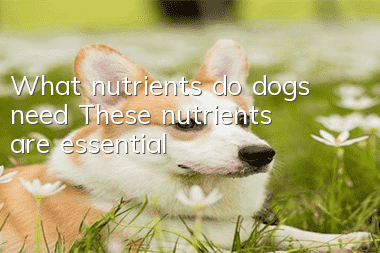What nutrients do dogs need? These nutrients are essential

Nutrition that dogs need: water
Water is one of the nutrients for dogs. The body of an adult dog contains about 60% water, and the proportion of puppies is even higher. All physiological activities and the metabolism of various substances in the dog's body must be attended by water to proceed smoothly. Water has a high specific heat, so it absorbs a lot of heat. The heat generated during the metabolism of the body is carried to the skin or lungs through the water and dissipated, and has the effect of regulating body temperature. Moreover, dogs have no special ability to store water in their bodies. Loss of water will cause death faster than fasting.When the water content in a dog's body is reduced by 8%, severe thirst will occur, appetite will be reduced, digestion will be slowed down, and resistance to infectious diseases will be reduced due to dryness of the mucous membrane. Long-term insufficient drinking water will cause blood viscosity and cause circulatory disorders. When dehydration causes body weight loss of 20%, death may result.
Nutrition that dogs need: protein
Protein is the basis of dog life activities. It is the most abundant substance in the body besides water, accounting for about half of the dog’s dry weight. Various tissues and organs in the dog's body, various enzymes involved in substance metabolism, and antibodies that protect the body from disease are all composed of proteins. In addition, protein is also needed when repairing wounds and replacing aging and damaged cell tissues. Therefore, protein is the most important nutrient for dogs. The basic substances that make up proteins are amino acids, of which there are about 20 kinds.Insufficient supply of protein or certain essential amino acids will cause the protein metabolism in the dog's body to become a negative balance, causing decreased appetite, slow growth, weight loss, reduced protein content in the blood, affecting the formation of antibodies, and reducing immunity. . The quality of semen of male dogs decreases and the number of sperm decreases. Female dogs have abnormal estrus and are infertile. Even if they become pregnant, the fetuses often suffer from stillbirth or malformation due to poor development.
However, excessive feeding of protein not only causes waste, but also causes metabolic disorders in the body, causing dysfunction of the heart, liver, digestive tract, and central nervous system, declining sexual function, and in severe cases, acidosis. Under normal circumstances, adult dogs need about 48 grams of protein per kilogram of body weight per day, while puppies during the growth and development period need about 9.6 grams.
Nutrition that dogs need: fat
Fat is one of the important sources of energy required by the dog's body. After each gram of fat is fully oxidized, it can produce 39.3 kilojoules of heat, which is higher than carbohydrates and proteins. The fat content in a dog's body is about 10-20% of its body weight.When there is a lack of fat in dog food, it can cause severe digestive disorders and dysfunction of the central nervous system, such as fatigue, rough coat, lack of sexual desire, underdeveloped testicles, or abnormal estrus in female dogs. However, excessive fat storage will cause obesity and will also affect the normal physiological functions of dogs, especially reproductive activities.
The daily fat requirement for puppies is 1.1 grams per kilogram of body weight. The daily fat requirement for adult dogs is calculated based on the dry matter of the feed. It is appropriate to contain 12 to 14%.
Dogs needNutrition: Carbohydrates
Carbohydrates are mainly used in the body to supply heat, maintain body temperature, and maintain various organ activities and movements. Excess carbohydrates can be converted into fat in the body and stored. When a dog's carbohydrates are insufficient, it must use body fat or even protein to supply calories. The dog will become thin and unable to grow and reproduce normally.The daily carbohydrate requirements of adult dogs can account for 75% of the feed, and the daily carbohydrate requirements of puppies are about 17.6 grams per kilogram of body weight.
Random articles
- What will happen if your dog’s beard is cut?
- What should you pay attention to when deworming your dog?
- How old should a puppy be to start deworming? What you must know when deworming a dog!
- Border Collie toilet training to develop good defecation habits!
- Causes and prevention of arthritis in dogs
- Should puppies be dewormed or vaccinated first when raising puppies?
- Among pet dogs, why is Labrador the most suitable as a guide dog?
- How to improve dog immunity? I’ll teach you 7 methods, please keep it!
- How to train a dog not to overeat food
- What should I do if my dog keeps moaning and barking? Will it feel better?



